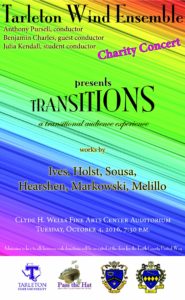Tarleton State University Wind Ensemble Presents
FOR IMMEDIATE RELEASE
Wednesday, September 21, 2016
STEPHENVILLE, Texas—The Tarleton State Wind Ensemble will present two concerts this fall to promote the university’s upcoming Centennial Celebration in 2017. Titled, Transitions, the first concert takes place at 7:30 p.m., Tuesday, Oct. 4, in the Clyde H. Wells Fine Arts Center Auditorium.
The concerts are free, but donations will be accepted. Proceeds will be donated to the university’s 2016 State Employee Charitable Campaign, known as Pass the Hat, and designated to the Erath County United Way.
Dr. Anthony Pursell, Tarleton’s director of bands and conductor of the wind ensemble, described the concert as, “An opportunity to experience the music at the time the university became a member of the Texas A&M System (1917) and transitioning to the current day. Some of the music presented during these two concerts also will forecast where the music of the wind band is going, much like the Centennial Celebration will reflect and forecast Tarleton’s relationship with Texas A&M.”
Transitions opens with Charles Ives’ Circus Band, written around 1894 and described by Pursell as, “…employing strong rhythmic figures that are typically not on strong pulses, similar to the Ragtime music that was on the horizon at the time.” Listeners can expect to experience the circus coming to town.
Following the Ives’ piece, visiting instructor of percussion Dr. Benjamin Charles will lead Gustav Holst’s monumental work for military bands, First Suite in E-flat. Written in 1909, Holst used folk tunes from English songs in one of the first organized efforts to standardize the wind band instrumentation.
The pivot point of the concert takes the audience from the past to the present and future, featuring student conductor Julia Kendall with John Philip Sousa’s The Thunderer. Following the Sousa march, the ensemble will perform the second movement of Ira Hearshen’s Symphony on Themes of John Philip Sousa.
This movement, titled After the Thunderer, will provide, “a hauntingly beautiful experience with the trio section of the march that is set similarly to the finale of Mahler’s Third Symphony,” Pursell said.
The concert will conclude with a work by composer Stephen Mellilo, titled Jidai, that employs several electronic instruments. Pursell commented that, “the band area already has seen the employment of electronic instruments for some time; however, I believe we will see a refinement of these instruments—eventually moving from a supporting role to being featured in some way. Jidai is a mixture of both supportive and featured electronic instruments with the traditional setup of wind instruments. I think we will see this more often, as we’ve already seen in the marching band setting.”
Tau Beta Sigma, a national band sorority developed to provide service to university band programs, will host a post-concert reception in the Fine Arts Center foyer.
To learn more about Tarleton State University’s bands, visit www.tarleton.edu/band.
Tarleton, a member of The Texas A&M University System, provides a student-focused, value-driven educational experience marked by academic innovation and exemplary service, and dedicated to transforming students into tomorrow’s professional leaders. With campuses in Stephenville, Fort Worth, Waco, Midlothian and online, Tarleton engages with its communities to provide real-world learning experiences and to address societal needs while maintaining its core values of integrity, leadership, tradition, civility, excellence and service.
#
Contact: Kurt Mogonye
254-968-9460
[email protected]

